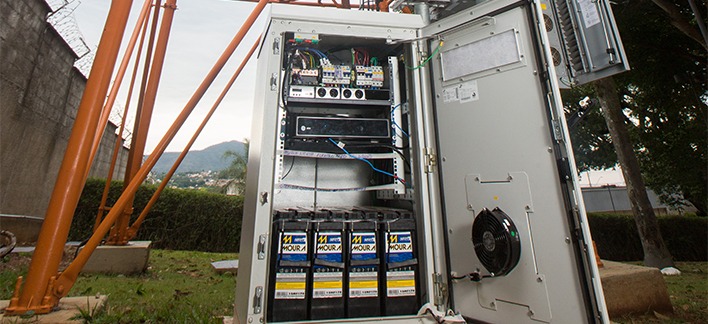
Neoenergia builds first private 4G network in Latin America
The company decided for its own 4G to ensure greater reliability of data transmission to the Operations Center. "As the equipment makes very fast decisions in the field and the information must arrive with agility, we need to have a secure communication technology, with high reliability and low latency", explains Heron Fontana, Neoenergia's Smart Grids superintendent.
The executive reinforces that the first evaluations indicate that the technology is promising for all the energy distributors of the group. Neoenergia installed, in partnership with Nokia, all the infrastructure to operate 4G, formed by the core, network management unit, and six base radio stations (eNodeB). It is worth mentioning that Neoenergia has authorization from the National Telecommunications Agency (Anatel) to use the 3.5 Gigahertz (GHz) frequency.
Unlike smartphones, 4G does not work as the main network for Neoenergia's activities, but as a backhaul, infrastructure to group the data and send them to the distributor's offices in Atibaia or Campinas. In practice, the information recorded by the equipment, such as reclosers and smart meters, is transmitted by two other networks - Wi-Sun and Prime PLC - to concentrators, which have the SIM Card of the network, such as the chip used in mobile devices. This equipment then communicates with the company's datacenter via the LTE network.
The use of the 4G network will initially benefit the 75 thousand Neoenergia consumers, through the Elektro distributor, in the cities of Atibaia, Bom Jesus dos Perdões and Nazaré Paulista. "It is an innovative initiative in the sector, which guarantees performance in critical actions and brings more quality service to the customer. It may have several applications, such as communication between field teams," says Fontana.
FUTURE ENERGY PROJECT
Started in November 2018, the Future Energy project should conclude, by the end of 2020, the installation of 75 thousand smart meters in the region of Atibaia. This equipment has several advantages, among them, the possibility of daily monitoring of energy consumption, allowing attitudes changing to save energy. In addition, the new meters make it easier to detect theft and fraud, reducing energy losses by up to 80%.
The initiative also included the installation of modern recloser equipment, which works with the AIR (Intelligent Network Automation) System to automatically recompose after power outages, often caused by problems such as tree falls and traffic accidents. This innovation is expected to result in a 40% reduction in the DEC (Equivalent Interruption Duration per Consumer Unit), an indicator established by the National Energy Agency (Aneel) to measure the quality of service, establishing, in hours, the perception of the time that a customer runs out of power in a period.
The smart grids installation project is a worldwide trend in the energy market, focused on security and efficiency of distribution. Neoenergia evaluates the expansion of the project to other cities in the states of São Paulo, Mato Grosso do Sul, Bahia, Pernambuco and Rio Grande do Norte.
OWN GRID IN FERNANDO DE NORONHA
Neoenergia maintains on Fernando de Noronha island, in Pernambuco, a project also of smart grids covering 900 customers. The meters have been replaced by intelligent models and the company has a private WiMAX network, with wireless access, for data transmission, in addition to solar generation and energy storage facilities, developed from Aneel's R&D and Energy Efficiency programs, contributing to sustainability and conscious consumption.
News
2026-02-26
MinC e Neoenergia investem R$ 6 milhões em projetos culturais de pequenas cidades
2026-02-24
Neoenergia é reconhecida por evolução em sustentabilidade
2026-02-11
Neoenergia encerra 2025 com lucro de R$ 5 bilhões
2026-01-29
Neoenergia conquista Prêmio Ibero-Americano de Qualidade pelo desempenho de suas distribuidoras
2026-01-21